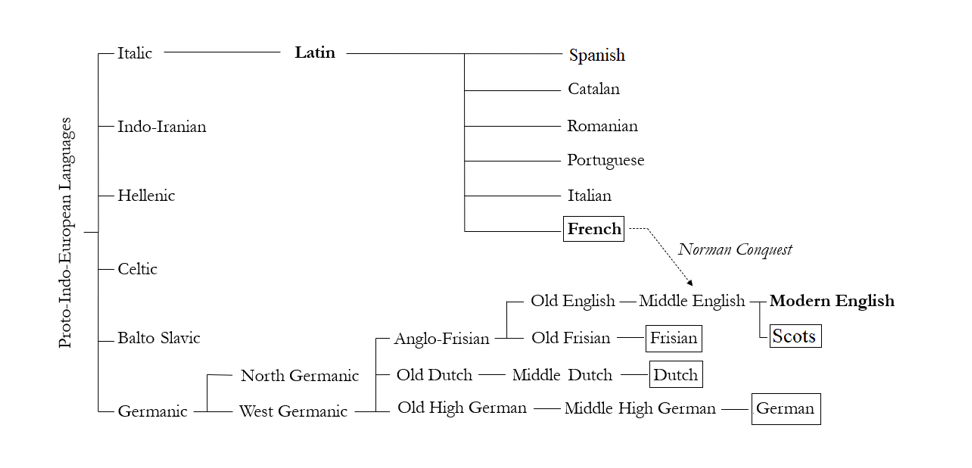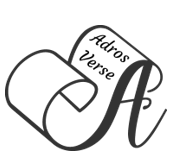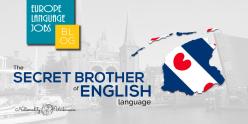Linguistic relationships have always fascinated many linguists and researchers, particularly English speakers who speak a language that has historically been influenced by many other languages. But which languages are similar to English? And which one among these similar languages is the closest?
English is a Germanic language. Yet, due to the Norman Conquest of England in the eleventh century, the English language borrowed a lot of vocabulary from French, a Romance language. Therefore, it should not be surprising that the closest languages to English belong to these two language families: Germanic and Romance languages.
In short, the Frisian language is the closest living language to English. However, there are some other Germanic and Romance languages that share with English substantial lexical and grammatical similarities. This article explores the most similar languages to English and sheds light on some of these similarities.

Germanic Languages
English falls under the Germanic branch of the Indo-European language family. Proto-Germanic is a reconstructed language that is believed to be the common ancestral tongue of all the Germanic languages that began separating around 500 BCE.
These languages include German, Dutch and Frisian along with Scandinavian variants like Danish Swedish and Norwegian that fall under this family of languages. These languages share similar grammatical structures, vocabulary, and phonetic features.
1. Frisian: The Closest Relative
Frisian is a language spoken by approximately 500,000 people living in Friesland province of the Netherlands and parts of Germany. It is widely considered the closest living language to English in both pronunciation and grammar. In general, Frisian phonetics hold strong resemblance to those in English, and the grammatical structures of Frisian and English show many parallels.
Here are some lexical examples of these remarkable similarities:
| English | Frisian |
| bread | brea |
| cheese | tsiis |
| house | hûs |
2. Scots: A Close Cousin
Scots, spoken in Scotland, is another close relative of English. Whereas some scholars consider it a dialect of English, many others classify Scots as a distinct language. In general, Scots has its unique vocabulary, pronunciation, and grammatical features.
Scots and English both evolved from Early Middle English, which explains the significant similarities. Scots shares many words with English but also has its own distinct vocabulary. Some of the English words we know today have Scots origin, such as “blackmail,” “clan,” “glamor,” and “golf.”
Here are some similar words between the two languages:
| English | Scots |
| about | aboot |
| friend | freend |
| houses | hoose |
3. Dutch: A Close Germanic Neighbor
Dutch is another Germanic language that is closely related to English. Spoken by about 23 million people primarily in the Netherlands and Belgium, Dutch shares many linguistic features with English, owing to their common Germanic ancestry.
In addition to shared vocabulary, Dutch grammar has similarities to English, though it also retains some distinct Germanic traits. Dutch has influenced English vocabulary, particularly in maritime and trade-related terms.
Let us examine some similar words between the two languages:
| English | Dutch |
| water | water |
| apple | appel |
| book | boek |
4. German: A Major Germanic Language
German, the most widely spoken native language in Europe, is also closely related to English. Both languages share many similarities due to their common Germanic roots, though German has retained more complex grammatical structures. Many English words have German origins, and vice versa, but German grammar is more complicated than English, with cases and gendered nouns.
Here are some cognates in the two languages:
| English | German |
| house | haus |
| hand | hand |
| friend | freund |
Intrigued by the topic? Learn more about German-English cognates!
5. Other Scandinavian Languages
Danish, Swedish, and Norwegian also share historical connections with English. These Scandinavian languages are part of the North Germanic branch of the Germanic family and have influenced English, especially during the Viking Age.
Some English words, particularly nautical terms, have Scandinavian origins. The Old Norse language of the Vikings left a significant mark on English. While modern Scandinavian languages have diverged, they still share basic Germanic features with English.
Here are some vocabulary examples in Danish, Swedish, and Norwegian:
| English | Danish | Swedish | Norwegian |
| window | vindue | fönster | vindu |
| knife | kniv | kniv | kniv |
| egg | æg | ägg | egg |
Romance Languages
English belongs to a family of languages called Germanic languages. Other examples of Germanic languages include: German, Dutch, Afrikaans, Swedish, Danish, and Norwegian. On the other hand, Spanish, Portuguese, Italian, French, Catalan, and Romanian fall under Romance languages.
Despite belonging to two distinct language groups, English shares a substantial amount of vocabulary with Romance languages, unlike other Germanic languages. The main reason is attributed to the Norman Conquest of England in the eleventh century, as a result of which, the English language borrowed a lot of French words. As a result, Romance languages are considered among the easiest languages to learn for English speakers.
1. French: The Closest Romance Language
French is a Romance language and shares Latin roots, and thus a lot of vocabulary, with other Romance languages like Spanish, Portuguese, and Italian. You can recognize the link here between these languages and English via the French language.
In terms of vocabulary, French is considered the closest Romance language by virtue of the direct contact between the two languages from the Norman Conquest in 1066 and onwards.
2. Italian: The Second Closest Romance Language
Lexically, French is particularly close to Italian, which is in turn close to Latin. In terms of grammar, Italian and French are very similar. Therefore, we consider Italian to be the second closest Romance language to English.
Other Romance languages such as Spanish, Portuguese, Catalan, and Romanian do share similarities with English but to a lesser extent.
Here is a list of some parallels between English and words in the four Romance languages: Spanish, Portuguese, Italian, and French:
| EN | SP | PT | IT | FR | Examples | |
| -ile | -il | -il | -ile | -ile | SP |
ágil, frágil, hostil |
| PT |
ágil, frágil, hostil |
|||||
| IT | agile, fragile, ostile | |||||
| FR | agile, fragile, hostile | |||||
| -or | -or | -or | -ore |
-eur -eure |
SP | interior, favor |
| PT | interior, favor | |||||
| IT | interior, favore | |||||
| FR | intérieur, faveur | |||||
| -ble | -ble | -vel | -bile | -ble | SP | notable, posible |
| PT | notável, possível | |||||
| IT | notabile, possibile | |||||
| FR | notable, possible | |||||
| -al | -al | -al | -ale |
-al -ale |
SP | animal, canal, local |
| PT | animal, canal, local | |||||
| IT | animale, canale, locale | |||||
| FR | animal, canal, local | |||||
| -ant | -ante | -ante | -ante |
-ant -ante |
SP | elegante, importante |
| PT | elegante, importante | |||||
| IT | elegante, importante | |||||
| FR | élégant, important | |||||
| -ent | -ente | -ente | -ente |
-ent -ente |
SP | inteligente, diferente |
| PT | inteligente, diferente | |||||
| IT | intelligente, differente | |||||
| FR | intelligent, différent | |||||
Conclusion
Languages that hold most resemblance to English belong to either the Germanic or Romance language family. Frisian stands out as being the closest living relative to the English language within the Germanic family of languages.
In addition, there are other similar languages in the Germanic family like Scots, Dutch, and German. On the other hand, French and Italian are the closest Romance languages to English. Exploring such linguistic ties offers a fascinating journey into language development - be it as an enthusiast, student or simply curious!
Author Bio

Adros Verse Education S.R.L. is a passionate language learning company who are on a mission to turn learning a new language into a fun, easy, and interactive experience! Through a dedicated collection of educational material, including extensive books and flashcards through the Anki software, we are committed to empowering readers of all ages and backgrounds to achieve their language-learning goals.
As the publisher of Learn & Retain Spanish, Portuguese, Italian, and French With Spaced Repetition, as well as numerous collections of Anki flashcards to suit beginner and advanced learners, Adros Verse Education S.R.L. aims to provide people with an informative and user-friendly approach to picking up new vocabulary, learning new phrases, and building confidence through the powerful spaced repetition methodology.























Gadis Larasati Perdana1y ago
New knowledge, loved it!
New knowledge, loved it!